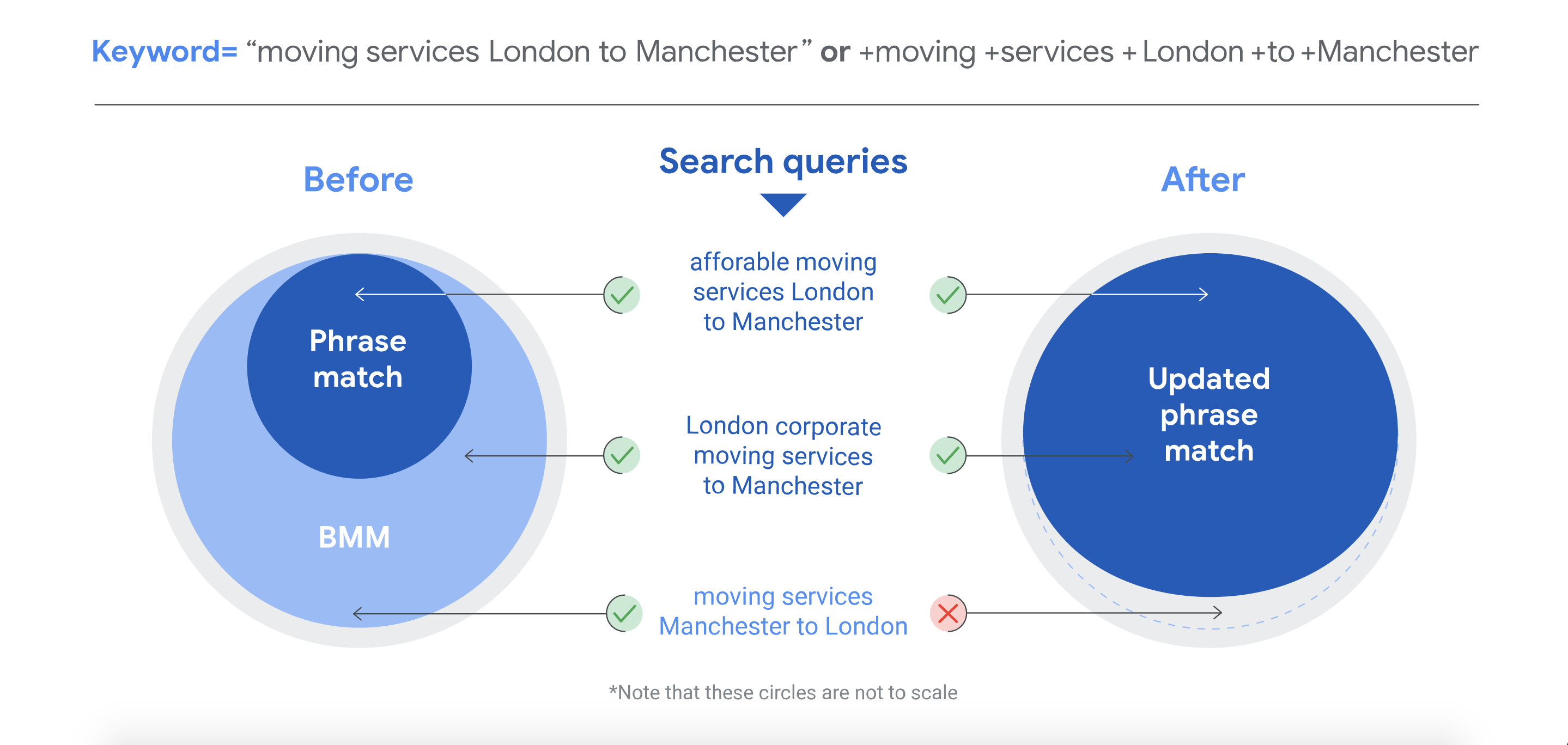Recently, Google Ads rolled out changes to the match types and the behaviour of phrase and Broad Match Modifier keywords. Below is what you need to know about these changes and why you should care about them.
If you require a refresher on match types and their previous matching criteria you can read about them here.
What has Google actually said will happen?
“Starting in February 2021, phrase match will begin to incorporate behaviours of Broad Match Modifier (BMM) to simplify keywords and make it easier to reach relevant customers. With this change, both phrase and broad match modifier keywords will have the same matching behaviour and may show ads on searches that include the meaning of your keyword”
When is Broad Match Modifier (BMM) going away?
The match type that used to allow you specific keywords with a “+” sign will no longer be available after June 2021.
How will we target BMM traffic from now on?
Phrase match is incorporating broad match modifier behaviour as of February 2021. In essence, your BMM keywords are already being covered by phrase match keywords. It’s likely that Google will roll out a recommendation in google ads to convert all BMM keywords to phrase match very soon. There is no need to wait for this though, if you want to make this change yourself then you can.
What about phrase matches word order functionality?
It will still be respected when that word order is important to the meaning of the search term. For example, “moving services from London to Manchester” will show your ad for “affordable moving services London to Manchester” but not if the order was reversed “affordable moving services manchester to London” as Google Ads will see the intent of this query differently.

Impacts
Will it affect my traffic?
Yes, probably. Google has said that it shouldn’t for the majority of advertisers but based on previous match type changes it would be a good idea to keep an eye on traffic fluctuations during the transition. If you start to see major changes in traffic volume then you should take action to protect your account.
There are certain instances we can think of where it definitely will affect your traffic volumes. These include:
1) If you use Broad Match Modifiers on some words but not others
For example +moving services. You’re likely to see decreases or increases in traffic for these keywords. The operator will now apply to both words. For example: +moving +services or it may make the entire query fully broad such as moving services. It’s not clear which at this stage so it’s recommended that you make changes to these types of keywords as soon as possible.
2) If you have large amounts of phrase match keywords in your account
You will likely see an increase in traffic for these as they take on additional broader behaviour. Be sure to keep an eye on this new traffic’s relevance and use negatives where needed.
3) If you have large amounts of BMM keywords in your account
You will likely see decreases in traffic as BMM takes on the same word order function as phrase match. This means queries that would usually match BMM will be filtered out due to google reading the intent of the search term differently. If you have a lot of BMM keywords in your account you may want to add additional phrase keywords to prevent this decrease in traffic.
4) If you’re still using match type based ad groups
If you have a designated BMM & phrase match ad groups targeting the same keywords they are effectively targeting the same search terms as of February 2021. These will be treated as duplicate keywords and you’ll likely see phrase match type ad groups get more traffic. It’s important to note that when you have duplicate keywords in your account the keyword with the highest ad rank will show your ads. This will make it easier for you to identify which keywords to keep and which duplicates to remove.
What about regular broad match?
Regular Broad Match will remain the same.
Is anything else affected by the changes?
Yes, keyword bidding behaviour for all match types will now be somewhat more predictable. For example, an exact match keyword that matches the query exactly will take priority over a phrase match or a Broad Match keyword providing it’s eligible to show and doesn’t have a poor ad rank.
Will it impact my quality score?
Google assures us it will not impact quality score.
Why does any of this matter?
It matters because Google are making changes away from keyword-focused bidding and towards audience-focused bidding with their automation. Ignoring these changes will negatively impact your account and not everyone is happy about these types of changes.
The issues a lot of advertisers have with a number of recent Google Ads changes have been that they’ve removed the ability to get highly granular keyword data from their account and use it to optimise their ads in favour of better automation, this change is no different.
Overall I believe this change could save you time managing keywords in your account in the long run but it is likely that you will need to do some reshuffling and retargeting of your current keywords.
Hopefully, you now have a better understanding of the changes. If you have any questions for us or require further expert guidance please get in touch.







